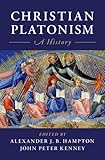Christian Platonism : a history / edited by Alexander J.B. Hampton, John Peter Kenney.
Material type: TextPublisher: Cambridge, United Kingdom ; New York, NY : Cambridge University Press, 2021Description: xv, 497 pagine : illustrazioni ; 24 cmContent type:
TextPublisher: Cambridge, United Kingdom ; New York, NY : Cambridge University Press, 2021Description: xv, 497 pagine : illustrazioni ; 24 cmContent type: - testo (txt)
- senza mediazione (n)
- volume (nc)
- 9781108491983
- 1108491987
- 230.01 23
- B 645.C53 2021
| Item type | Current library | Call number | Status | Barcode | |
|---|---|---|---|---|---|
 Opera (Magaz.)
Opera (Magaz.)
|
Biblioteca "Angelicum" Pont. Univ. S.Tommaso d'Aquino Temporary Library | B 645.C53 2021 (Browse shelf(Opens below)) | Available | 0030215641 |
Bibliografia.
"Anyone wishing to understand the Christian tradition deeply must consider the central, formative role of Platonism. At various times Platonism has constituted an essential philosophical and theological resource, furnishing Christianity with a fundamental intellectual framework that has played a key role in its early development, and in subsequent periods of renewal. Alternately, at other times, it has been considered a compromising influence, conflicting with the faith's revelatory foundations and distorting its inherent message. In both the positive and negative cases, the central importance of Platonism, as a force which Christianity defined itself by and against, is clear. Equally, this process of influence is not unidirectional".


